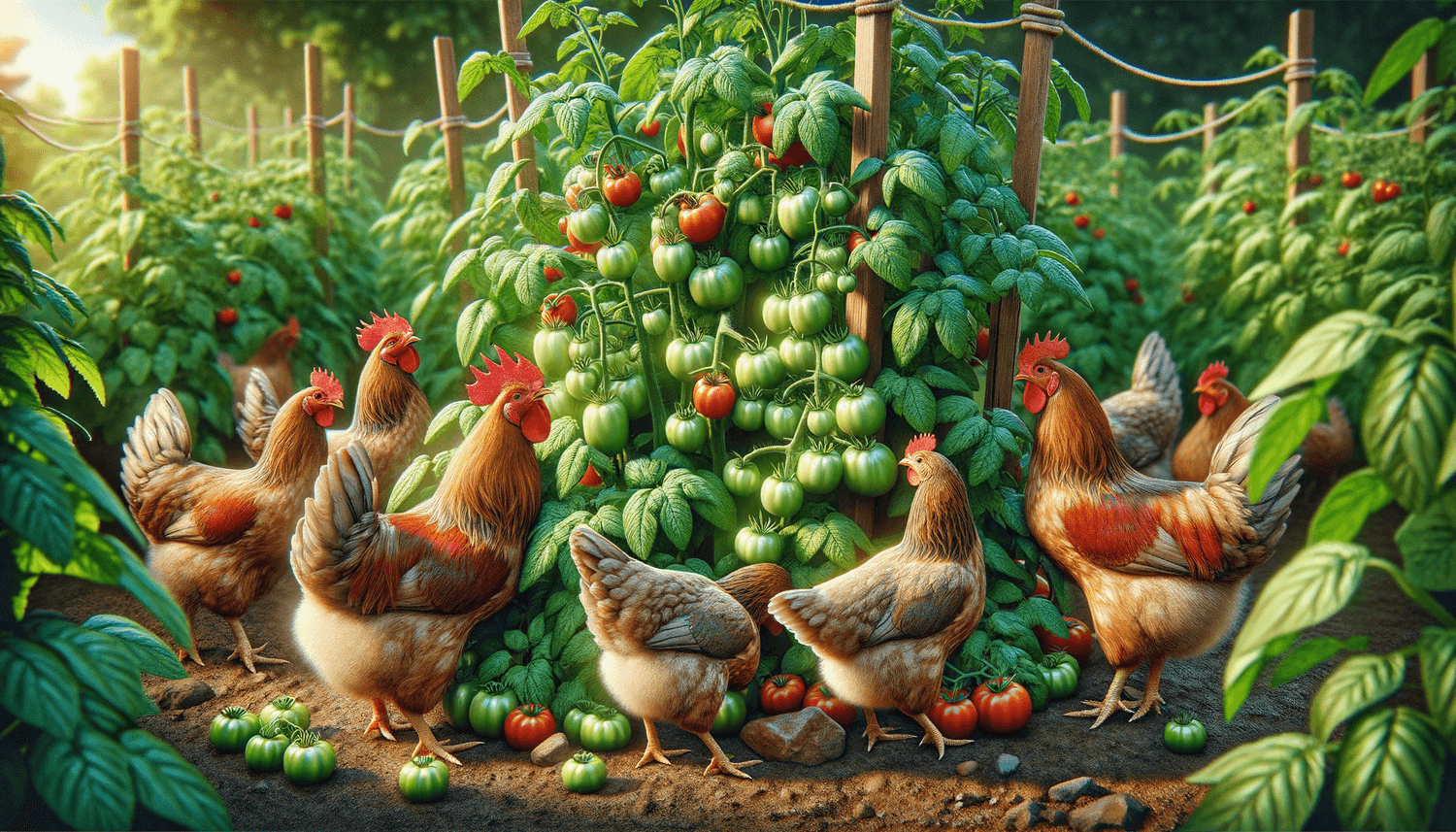Welcome, fellow chicken enthusiasts! Today, we’re going to answer the tantalizing, tomato-licious question that plagues every clucky backyard chicken owner: Can our feathered friends eat tomato plants? In this fun-filled blog, we’ll dive into the world of chickens and tomatoes, exploring topics like the importance of maintaining a balanced diet, the potential benefits and risks of tomato plants, their nutritional value, and how to serve them up in a cluck-tastic way. Prepare to be en-thrilled with our delectable discoveries!
Can chickens eat tomato plants?
No, chickens should not eat tomato plants, as they are potentially harmful to their health. Tomato plants, including their leaves and stems, contain a toxic substance called solanine, which can be dangerous for chickens if ingested in large quantities. While the fruit (tomato) itself is safe for chickens to eat, it is better to keep them away from the rest of the plant to ensure their safety.
A balanced diet for backyard chickens
Just like humans, chickens need a balanced diet to maintain their overall health and well-being. A well-rounded diet will ensure they receive the appropriate nutrients, allowing chickens to grow, produce eggs, and lead happy lives in your backyard. The foundation of a chicken’s diet should primarily consist of a high-quality chicken feed, which is specifically designed to meet all the nutritional requirements of backyard chickens.
This chicken feed should make up around 80-90% of a chicken’s diet, providing them with the essential proteins, vitamins, and minerals they need for optimal health. The remaining 10-20% of their diet can consist of treats like fruits and vegetables, which can provide additional nutrients and variety in their menu. Remember, a happy and healthy chicken comes from a balanced diet – so make sure to pick high-quality chicken feed and supplement with treats, in moderation.
Nutritional value of tomato plants for chickens.
As mentioned earlier, chickens should not eat tomato plants due to the presence of the toxic substance solanine in the leaves and stems. However, it is important to note that chickens can safely consume the fruit part of the plant, which is the tomato itself. The tomato fruit holds a good amount of nutrition for chickens, which we will explore in the following paragraphs.
Tomatoes are rich in vitamins, particularly vitamin C, which serves as a strong antioxidant and supports overall immune function. Additionally, tomatoes provide vitamin A, which is essential for vision and promotes healthy growth and development. Moreover, they are also a good source of potassium and phosphorus, which contribute to the proper function of a chicken’s nervous system, muscles and eggshell formation.
One of the additional benefits of feeding tomatoes to chickens is their high water content, which offers hydration and can help regulate body temperature during hot weather. Furthermore, the fibrous nature and antioxidants found in tomatoes can aid in a chicken’s digestion and promote gut health. Although tomatoes can provide these valuable nutrients for chickens, it is crucial to remember that tomatoes should only be offered as an occasional treat, and a nutritious and well-rounded diet is crucial for maintaining their overall health.
Nutrition table of tomato plants for chickens.
| Information | Description |
|---|---|
| Nutritional Value | Tomato fruits provide vitamins A and C, potassium, phosphorus, and antioxidants. |
| Suggested Serving Size | Offer as an occasional treat, within the recommended 10-20% of a chicken’s diet. |
| Safe Feeding Practices | Only feed chickens the tomato fruit, avoiding the leaves, stems, and green tomatoes. |
| Preparation | Remove stems and leaves, then wash and cut tomatoes into small pieces to avoid choking hazards. |
| Potential Risks | Feeding chickens tomato plants (leaves and stems) can be harmful due to the toxic substance solanine, which leads to health issues when ingested in high quantities. |
| Hydration | Tomatoes have high water content, thus providing hydration and helping with body temperature regulation in hot weather. |
| Digestion | Tough fiber and antioxidants in tomatoes can support digestion and gut health in chickens. |
| Seasonal Availability | Tomatoes are readily available year-round, with the freshest samples showing up during summer months. |
| Other Benefits | Tomatoes can contribute to immune function, vision, and growth thanks to their vitamins and minerals. |
An alternative treat: Tomato fruit
As we’ve established, chickens should avoid consuming tomato plants, including the leaves and stems. However, the fruits are perfectly safe and nutritionally beneficial when offered as occasional treats. It’s important to be cautious and conscious of the type of tomato treat you offer your chickens. Make sure the tomatoes are ripe and red, as green tomatoes can still have solanine, which poses a health risk to your feathered friends.
Preparing tomatoes for your chickens
Proper preparation is essential when feeding tomatoes to chickens. Be sure to remove any stems, leaves, or vines, which could contain solanine. To ensure your tomatoes are safe and clean, thoroughly wash them before cutting them into small, bite-sized pieces to prevent choking hazards. Smaller cherry or grape tomatoes can be simply halved or quartered. By following these preparation steps, you’ll enhance your chickens’ safety and enjoyment of this nutritious treat.
Monitoring your chickens’ health
It’s essential to keep an eye on your chickens’ health when introducing any new food item to their diet, including tomatoes. Signs of solanine poisoning, like weakness, irregular breathing or increased heart rate, diarrhea, and vomiting, may indicate that the bird has consumed a dangerous portion of the tomato plant. In such cases, contacting a veterinarian as soon as possible is important, as early intervention can help mitigate the effects of solanine ingestion.
Overall, the keyword is moderation when offering your chickens tomato fruits as a treat. By adhering to safe feeding practices, providing a balanced diet and taking proper steps in preparation, you can ensure that your chickens enjoy a healthy and varied diet.

















